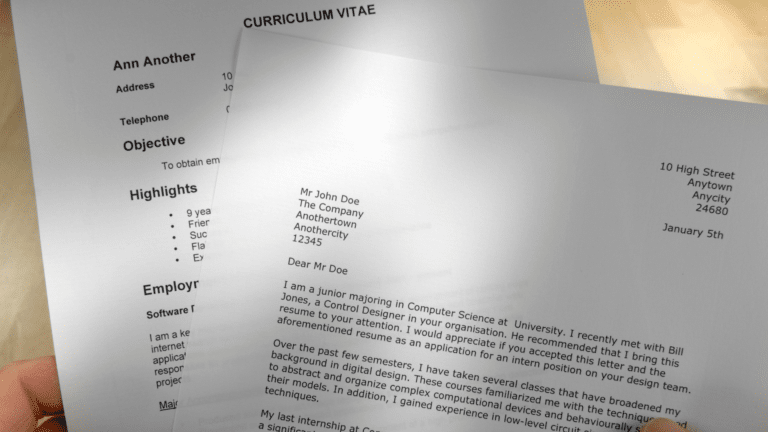Mentorship can be a great way to grow in your career—to develop extra skills, earn a higher salary, or be promoted. However, if you don’t know how to ask someone to be your mentor, doing so can be harrowing.
Mentors are an invaluable resource of knowledge, as their advice can help you overcome challenges and make significant progress on your career path. If you were wondering how to find one, you’re in the right place.
In this guide, you’ll not only learn how to ask someone to be your mentor at work, on LinkedIn, or via email, but it will also give you the confidence to do so. Let’s get started!
Key Takeaways
- The most convenient way to ask someone to be your mentor is by reaching out to them via email or LinkedIn.
- Before reaching out to them, research mentors in order to find the one that suits you.
- Once you’ve found them, you should prepare for and arrange a meeting where you will elaborate on your goals.
- Stay in touch with your mentor after the meeting so that you can inform them of the steps you want to take in the future.
Crucial Considerations Before Asking Someone to Be Your Mentor
Prior to even thinking about asking someone for mentorship, there are two highly consequential things you need to consider.
Why Do You Want a Mentor?
Before you reach out to anyone for mentorship, think about what you want to learn in the first place, as well as what career goals you’re striving for.
Are you looking forward to improving hard or soft skills that you already have or acquiring new ones? Or are you possibly seeking to learn some new strategies for dealing with tight deadlines and stress management?
Your primary motivation is the main driver of the whole process, and having crystal clarity on this before asking someone to be your mentor will likely make or break your ultimate success in getting that person to say yes.
Some of the things you should consider while contemplating your reasons include, but are not limited to:
- Communication skills
- Problem-solving skills
- Leadership skills
- General guidance for resolving challenges
- Strategies to undertake or practice
- Getting a career direction
- Obtaining support in a particular area
- Building your network and networking skills
- Working towards a promotion and pay raise
Whatever your goals are, write them down along with two or three more things that you’d like to discuss with your prospective mentors. These should be your top priorities, as there are various types of effective mentorship, so it’s essential to be aware of what you’re looking for.
Research Potential Mentors
Finding a great mentor is like finding a good psychotherapist—it takes thorough research before you discover the one that suits you best. Therefore, don’t stick to the first one that you stumble upon.
Since it is a person who will take you under their wing, share their knowledge with you, offer advice, and help you grow and develop, a good mentor should have a set of specific characteristics.
Some of them are:
- Expertise—a mentor needn’t necessarily be older, but they should be more experienced and knowledgeable than you.
- Self-awareness—they need to be aware of their strengths and weaknesses.
- Empathy and passion for helping others—a good mentor should always support and root for you.
- Active listening skills—they need to have strong listening skills to be fully engaged and ask the right questions.
- Give honest and straightforward feedback—they know how to give feedback even if it’s not pleasant to hear.
A good mentor should not only meet your requirements but also match your working style. For this reason, it’s essential to know precisely why you want a mentor before you start searching for one.
If you already have someone in mind, that’s a good start. Otherwise, you’ll have to thoroughly look for one.
The best options include personal networks and coworkers, LinkedIn, and industry leaders. If you’re still a student, you can ask your teachers, professors, recent graduates, or alumni for mentorship.
Best Ways to Get in Touch With The Mentor
Once you have identified your objectives and chosen the prospective mentor, it’s time to reach out to them. The most obvious and convenient ways to do so are via email or LinkedIn message, and we will provide great samples for both, so stick around.
A word of warning, though—don’t contact them if you’re not yet sure why you want a mentor in the first place. If they say yes, they will be investing the most valuable assets—their time and knowledge—so be as respectful as possible and make sure you’re not wasting their resources.
How to Ask Someone to Be Your Mentor via Email
To ask someone to be your mentor via email specifically, follow this format:
- Start by describing what you like about them. Don’t resort to flattery right away; just acknowledge their expertise.
- Explain what you would like to learn and ask if they are willing to establish the relationship.
- Think about what you have to offer in return for mentorship, as they should benefit from it as well.
- Emphasize that you’re ready to work hard and commit your time, effort, and energy to take advantage of their guidance.
- Acknowledge and respect their time. Your prospective mentor might be extremely busy and in demand, so make sure that you mention that.
Sample Letter
Here’s a sample letter for asking someone to be your mentor in an email:
| Dear Mark,
My name is Jonathan Bell, and I am reaching out to you because of your unrivaled background and expertise in digital marketing. I have been following your work closely, and I am truly inspired by your achievements. I am currently working as a product owner, but I am also passionate about digital marketing, and I am eager to learn and grow in this field. I was particularly drawn to your profile because of your skills and experience. Your journey and success resonate with my own aspirations, and I believe that your guidance and insights could greatly contribute to my professional development. I understand that your time is valuable, and I would be honored if you could spare some time for a mentorship opportunity. I am seeking advice on email and social media marketing, and I believe that your expertise would be invaluable in helping me navigate these challenges. This mentorship could be beneficial for you as well. As someone new to the industry, I can provide a fresh perspective on emerging trends and innovative ideas that might be overlooked. In addition, while seeking guidance, I am more than willing to put my current marketing skills at your disposal. I am flexible and willing to accommodate your schedule and a format that suits you. Your mentorship would mean a lot to me, and I am committed to making the most of your guidance. Thank you once again, and I hope to hear from you soon. Best regards, Jonathan Bell |
How to Ask Someone to Be Your Mentor on LinkedIn
To ask someone to be your mentor on LinkedIn, you can use the following example as inspiration:
| Hello Darren,
Your expertise in the field of SEO caught my attention, and I am reaching out because I am eager to learn and grow in this field. I currently work as a content writer, so I’d value your guidance. I’m hoping you will be able to benefit from my creativity and content writing skills, which I’ll gladly place in service of your SEO strategies. All the best, Keith |
What to Do When Your Future Mentor Accepts
If your desired mentor accepts the proposal, you’ll need to work out your mentorship schedule and make sure this process is as smooth for the mentor as possible.
Here are three crucial steps to take:
Step 1: Prepare for the Meeting
Now that you have connected with the mentor and arranged the meeting, it’s time to prepare for it. You don’t want to mess up the mentorship opportunity because you came unprepared and without a vague idea of what you actually want.
To prepare for the meeting and avoid wasting your mentor’s time, draw up a list of questions you’d like to ask them. Needless to say, don’t come up with some random questions; they need to be related to your career goals.
Make sure that your questions are clear and specific. Although they are knowledgeable, a mentor may not be able to provide a good answer if your inquiries are overly vague and broad. On the other hand, clear-cut questions will allow them to grasp your needs or goals and offer valuable insights.
Here are some questions that you may ask them:
|
Step 2: Meeting with the Mentor
Don’t wait for an opportunity to bump into your prospective mentor; create it instead—invite them for a meeting over coffee. Naturally, you will be expected to pay for it, so don’t leave your wallet at home.
Such a semi-formal meeting is much more convenient than chasing your mentor down the hallways just to grab a second or two of their time and spill the beans about mentorship out of nowhere. It will enable you to get to know each other better, which may be of great help. You’ll also have enough time to formulate your request and elaborate on it.
Make sure that you have devised your mentorship plan prior to the meeting; don’t wait for your mentor to devise it on their own. The focus should be on your goals and what you want to achieve during the mentorship. Yet, keep in mind that your mentor is a busy person, so try to accommodate your plan to their schedule.
When your mentor arrives, greet them cordially and introduce yourself. If you haven’t already mentioned how you learned about them, you can do it during the meeting. Don’t forget to praise them for their experience; you may even say why you love their approach to the specific field.
Finally, explain what you want them to help you with. This is the perfect opportunity to elaborate on your goal and ask them all the questions you have previously drawn up. If they come up with some suggestions and proposals right at the meeting, make sure that you jot them down instantly.
Step 3: Follow Up
If everything goes according to plan, they should say yes to mentoring you. Now that you have established the relationship, you can devise a plan for ongoing communication.
This is the perfect opportunity to ask them for their opinion on your resume or CV or seek their advice on your career path. If you’re considering a career change, you can ask them whether or not it would be a smart move at the moment.
Inform your mentor of the progress and achievements you make during the mentorship. They will be glad to hear that you’re flourishing. Whenever you come across a challenge you can’t deal with on your own, don’t hesitate to ask them how to overcome it; after all, they are here to offer their help and guidance.
5 More Tips to Consider When Asking Someone to Be Your Mentor
We’ve already covered the most important bits on how to go about this potentially life-changing endeavor, but we’ve prepared another five tips to keep in mind.
#1. Express Gratitude
Always keep in mind that the person you want to be your mentor isn’t obliged to say yes to your proposal. They likely have a lot on their own plate, or they might not even feel ready to be someone’s mentor.
If they decline, be respectful of their decision. Show gratitude and thank them for their time.
Rejection may indeed hurt; however, don’t be discouraged or disheartened. Remember that it has nothing to do with you, and look for another mentor.
#2. Identify Values
Before you ask someone to be your mentor, make sure that your values match. No matter how great a professional they are, their communication style, values, and attitudes may not suit you, or they may simply not be a good mentor.
Your first meeting is an excellent opportunity to see if your prospective mentor is good for you. According to the research project called “Turning the gender diversity dial,” you should feel empowered and confident by their mentoring, as 87% of mentors and mentees do.
However, if you don’t feel a good connection right after the meeting, then they are not the right choice.
#3. Ask for Honest Feedback
Let your mentor know straight away that you want honest feedback from them, no matter how harsh it may be. Everyone wants to hear that they are doing great, but there is no point in flattering, as it will not help you grow and develop much.
Honest feedback is essential for professional development, as it can help you identify both your weaknesses and strengths.
#4. Praise Them
Acknowledging your mentor’s help publicly is a powerful way to not only express gratitude but also to highlight the impact of their mentorship on your professional and career growth.
Mentorship will be beneficial to them as well since their chances of getting promoted increase sixfold.
You can share some stories, specific examples, or their qualities that made a striking difference in your career. This way, you’ll showcase your mentor’s expertise as well as the value of their guidance.
The most convenient way to praise your mentor is via social media networks, particularly LinkedIn, professional platforms, or during some conferences or public events. Make sure not to overdo it, as it may look dishonest.
#5. Take the Time
Rome wasn’t built in a day, so neither will your relationship with your mentor. Patience is crucial here, as it may take time to build a solid connection. There is no point in rushing, as it can only hinder your development and the trust between you and your mentor.
Therefore, don’t expect quick results, and don’t try to push it, as there won’t be any good. Take every step at its own pace, and be consistent. You will be amazed by the outcome.
Final Thoughts
Mentorship programs are nothing new, as 84% of Fortune 500 companies have such programs.
However, not knowing how to ask someone to be your mentor may be a huge roadblock. Add the fear of rejection and humiliation, and you’ll most likely refrain from undertaking such a venture.
Yet, it needn’t be so. With our guide, you should enhance your tenacity to ask for mentorship and learn how to best go about it. You’ve got nothing to lose, but you can gain a lot.














